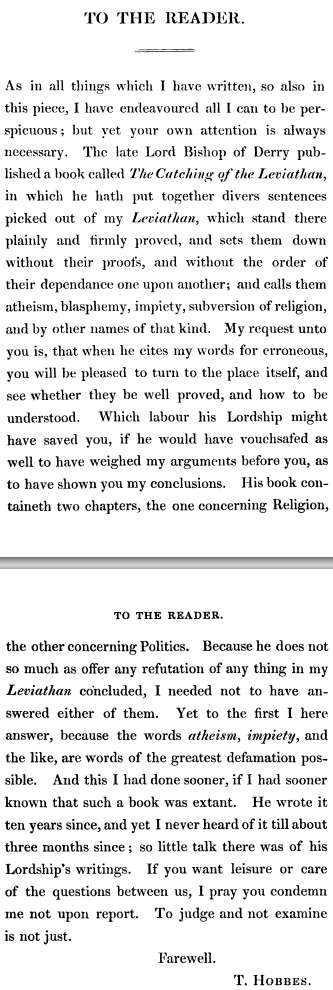 From An Answer to Bishop Bramhall's Book, called " The Catching of the Leviathan" by Hobbes.
From An Answer to Bishop Bramhall's Book, called " The Catching of the Leviathan" by Hobbes.
Elegantly put, and I expect to use it elsewhere.
 From An Answer to Bishop Bramhall's Book, called " The Catching of the Leviathan" by Hobbes.
From An Answer to Bishop Bramhall's Book, called " The Catching of the Leviathan" by Hobbes.
Elegantly put, and I expect to use it elsewhere.
OT - Ron has an interesting set of posts regarding fossil fuel reserves and the chances of > 6 degrees of warming, > 1000 ppm CO2
http://rhinohide.wordpress.com/
Another OT
One annoying aspect of the new layout is the lack of comment counts on the main page. I tended to glance at this part of each entry to see if there was anything new, but I've been cruelly robbed of that habit.
[Sorry about that. I did mail "da man" when this first came out, but got no reply. I'll try again, now things should have settled down -W]
[And the answer comes back "...these issues are on our agenda, once the last little bugs are worked out of the new site we will turn our attention to making improvements." -W]
More OT - no blog roll?
[You're right. Um, I wonder where that has gone... I'll see if I can find it... don't hold your breath... -W]
How would Hobbes organize society to avert climate change?
[Troublemaker. Its a good question though, I shall ponder it -W]
This is great fun http://denialdepot.blogspot.co.uk/2012/05/summer-shattered-no-warming-s…
If I mention that
http://gfspl.rootnode.net/klimat/arcticice.png
is looking more interesting, is that likely to hasten your insightful comments on sea ice or delay them?
http://www.ijis.iarc.uaf.edu/en/home/seaice_extent.htm
looks less interesting, especially when you know there is always a big upward adjustment to the latest data.
[Um, I'm not sure how to reconcile those two pictures -W]
In the same vein, what may the final word on the wages of hype in the Climate Wars antedates the Boston tea party --
In 1756 the great evangelist John Wesley published a pamphlet warning the world to repent before the End of Days , which he warned would arrive in 1758, when “The Earth would be set afire and burnt to a coal’ by Halley’s Comet.
This cased consternation,until one Paul Gemsege took exception, by offering an elegant Newtonian proof that that the mighty Methodist had his comet orbits crossed, and had confused the “excellent and accurate Doctor Halley’s” harmless namesake with an obscure Jacobean comet of 1680 that will not be returning until 2256.
This so impressed the Editors of the Gentlemans Magazine that they gave Gemsege space to publish what may be the first science Op-ed in the English language. It concludes thus:
Authors who throw out such important particulars as these, though it be done with the best design in the world, should be very sure of their hand before they alarm us with their notices, lest by the subjecting of weak minds to groundless paines they should contribute to embitter their lives, which has in it something most very cruel , and even criminal.
It is a Principle of the Protestant Religion that ,'as the tree falls so must it lie,' a reflection that if considered withal, to how many real disasters, without having recourse to any imaginary ones , the life of man is daily exposed will be abundantly sufficient for the purpose of true religion.
That is to make men think on the judgment of the Great Day Therefore there is no reason to distract their minds by unreasonable fears that, as they tend to so greatly distract them, instead of doing them any service , are likely to do them a great deal of harm.
>"[Um, I'm not sure how to reconcile those two pictures -W]"
You do realise one is area and one is extent? Area is necessarily less than extent by definition. I suggest area tends to fall first and later, when concentration approaches 15%, extent follows. But it doesn't have to appear like extent follows area.
[Oops no I'd missed that at a quick look. Still in normal years you'd expect the same relations to hold -W]
I only posted link to extent as well as area because I didn't want to appear to be cherry picking the bad looking one. I think area is more useful than extent especially with this new noisier IJIS measure but you are free to prefer what you prefer (go on choose to prefer DMI currently with data to 18th June 2012!!! http://ocean.dmi.dk/arctic/plots/icecover/icecover_current.png ).
[Area vs extent: I think you can fall victim to over-interpreting. Having worked directly with this stuff in the past, the retrieval of ice concentration from satellite isn't exact, which is a reason to prefer extent. Area probably gives a false sense of precision.
And be fair, it does say June 2010... -W]
I understand the retrieval of ice concentration isn't exact. However if my preference for area comes from attempting to predict minimum extent with either extent or area or both and finding that using area results in lower errors than using extent. Is that a valid reason for perferring area to extent or do you still think I am falling victim to over-interpreting?
[If it works, empirically, then... I guess it works -W]
2010 - that's worse, they are claiming 2 years of clairvoyance!!! ;o)